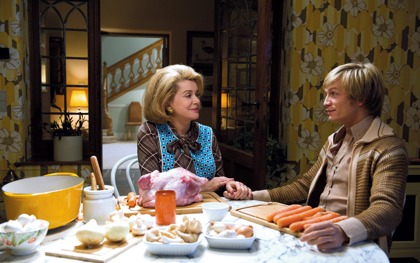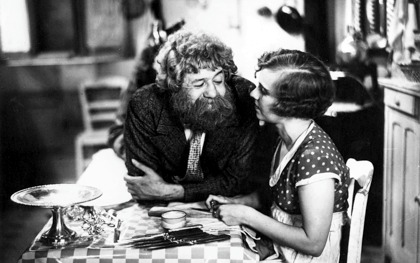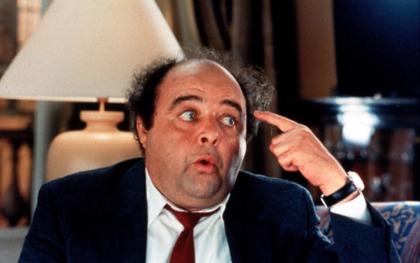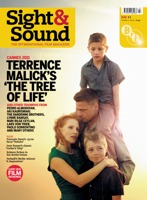A love-hate relationship: French cinema and boulevard theatre

Director François Ozon’s Potiche turns a 30-year-old farce into a riot of 1970s kitsch. Ginette Vincendeau looks back over the love-hate relationship between French cinema and boulevard theatre
It takes some nerve today for a ‘cool’ French filmmaker to adapt a boulevard play, as François Ozon has done with Potiche. The theatrical genre has long been despised by the French cinema establishment, and yet it has formed a consistently rich and varied source of material for French films, while also influencing their visual style. Boulevard theatre owes its name to the Boulevard du Temple in Paris – and more generally the grands boulevards – where theatres clustered from the second half of the 18th century, and where many can still be found. The ‘genre’ refers to popular plays, mostly comedies that have their roots in the theatre of Marivaux and the vaudevilles (in the French sense, meaning a farce, sometimes with songs) of Georges Feydeau, Eugène Labiche and Georges Courteline.
In the 20th century, French boulevard theatre remained lively, with the works of Sacha Guitry, Marcel Pagnol, Marcel Achard, Tristan Bernard, Robert de Flers and Gaston Arman de Caillavet, and – among many others – Pierre Barillet and Jean-Pierre Grédy, the authors of Potiche. The plays are solidly structured, middlebrow pieces of comic entertainment with middle-class settings and themes. A la Feydeau, the plots show a predilection for adultery, comic misunderstandings and bombshell revelations, all delivered in trademark witty dialogue. Despite boulevard theatre’s reputation for superficiality, the plays often mock institutions such as the army or educational establishments, and any form of pomposity generally.
A few silent French films were based on boulevard plays, but the coming of sound saw a veritable avalanche of adaptations – almost a third of French films in the first half of the 1930s. This provoked heated debates that pitted the defenders of ‘pure cinema’, spearheaded by René Clair, against the partisans of ‘canned theatre’ (as its enemies called it), led by Marcel Pagnol. The Marseille playwright adapted his own works for cinema, to huge success – for instance 1931’s Marius. Others followed suit, such as Louis Verneuil and Jacques Deval. But their king was Sacha Guitry, with films such as Faisons un rêve (1936) and Quadrille (1937) that met with critical consternation and box-office triumph.

Boudu Saved from Drowning
These adaptations had important consequences for the aesthetics of French cinema, privileging dialogue, ensemble framing and flamboyant performances by the likes of Raimu, Jules Berry, Edwige Feuillère and Arletty. But if this tradition was – and still is – contrasted negatively with ‘superior’ dramatic cinema based on original scripts, very few filmmakers have escaped its influence altogether, given its pervasive place in the culture. It is not often remarked, for example, that Jean Renoir adapted several such plays in the late 1920s and early 1930s: Tire au flanc (1928), On purge bébé (1931), Chotard et Cie (1932) and most famously Boudu Saved from Drowning (1932). Typically the failures (eg Chotard) are blamed on the plays, while the successes, in particular Boudu, are seen as Renoir ‘transcending’ the original material.
The 1930s were the heyday of boulevard-play adaptations, though they continued under German occupation – and of course the best-known film of the period, Les Enfants du paradis (1945), is about the Boulevard du Temple theatre itself. During the 1950s, mainstream genres evolved to make way for different kinds of comedies, as well as the policier and the costume film, although prominent film directors still had recourse to boulevard theatre for their source material – for example Claude Autant-Lara with the Feydeau classic Occupe-toi d’Amélie (1949) and Henri-Georges Clouzot in his sole comic effort, Miquette et sa mère (1949, based on a play by Caillavet and de Flers).
The coming of the New Wave and François Truffaut’s assault on French ‘tradition of quality’ cinema might have been expected to sound the death knell for boulevard-play adaptations. Yet while the 1960s and 1970s did indeed privilege naturalistic, political auteur films, what we might call ‘boulevard cinema’ did not die, and has survived to the present day in a number of forms.

A new generation of mainstream playwrights took up where their elders left off, feeding into some of the most successful French comic films of the last decades – for instance Jean Poiret’s La Cage aux folles, filmed by Edouard Molinaro in 1978, and more recently Le Dîner de cons, written and directed by Francis Veber in 1998. (Both were big enough hits to warrant Hollywood remakes.) In a different vein, auteur filmmakers have drawn on such popular texts and adapted them to their own ends: Agnès Jaoui and Jean-Pierre Bacri reworked their play Un air de famille for cinema (directed by Cédric Klapisch in 1996), before becoming established as filmmakers in their own right with Le Goût des autres (2000). The veteran Alain Resnais, meanwhile, has frequently adapted French popular theatre (not to mention Alan Ayckbourn), most recently with Pas sur la bouche (2003).
Meanwhile it should be said that ‘straight’ filmed boulevard plays continue to be popular on French television, whether Potiche itself in 1983, or Feydeau’s Un fil à la patte, staged this year at the Comédie Française and broadcast in April. The genre also continues to thrive on stage in Paris, where a roster of film stars can be seen, including veterans of the calibre of Jean-Paul Belmondo in the 1990s (who even acquired his own boulevard theatre, the Théâtre des Variétés) and Alain Delon this year. Highbrow critics may despise the genre – its obsolescence is often decried – yet clearly there is still a lot of life in boulevard theatre and the cinema it fuels – as Potiche, for one, demonstrates.
See also
Pas sur la bouche reviewed by Ginette Vincendeau (May 2004)
8 Women reviewed by Ginette Vincendeau (December 2002)
Le Dîner de cons reviewed by Philip Kemp (July 1999)




